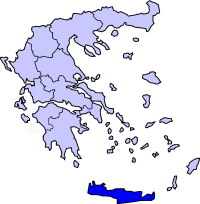This is an old revision of this page, as edited by SmackBot (talk | contribs) at 22:47, 15 April 2007 (Date/fix the maintenance tags). The present address (URL) is a permanent link to this revision, which may differ significantly from the current revision.
Revision as of 22:47, 15 April 2007 by SmackBot (talk | contribs) (Date/fix the maintenance tags)(diff) ← Previous revision | Latest revision (diff) | Newer revision → (diff)The official language of Greece is Greek. In addition, a large number of non-official, minority languages and some Greek dialects are spoken as well.
Greek
Standard Greek is the only official language of the Hellenic Republic, and is spoken by some 99% of the population. (though not nessicarily as a first language). Modern Greek is the officially used standard, but there are several non-official dialects spoken as well.

Cretan
Cretan Greek is spoken by upwards of half a million people on the island of Crete, as well as in the Greek Diaspora. It is rarely used in written speech, and differs much less from Standard Greek than other dialects.
Pontic
The Pontic Greeks also have a distinct dialect, spoken by 200,000 in Greece.
Tsakonian
The little-spoken Tsakonian dialect is used by some in the Tsakonia region of Peloponnese. The dialect is split into three sub-dialects, Northern, Southern, and Propontis. The dialect is spoken by only 1,200 people.

Yevanic
A Jewish dialect of Greek spoken by the Romaniotes, Yevanic is almost completely extinct today. There are a total of roughly 50 speakers, around 35 of whom now reside in Israel. The language may still be used by some elderly Romaniotes in Ioannina.
Minority languages
See also, Minorities in Greece.
Albanian
See also, Albanians in Greece.
Albanians make up the largest group of immigrants to Greece (as of 2001, there are at least 443,550 Albanian citizens in the country ). As such, the Albanian language is widely spoken by these emmigrants.
Arvanites
The Arvanites are an ethnic group traditionally living in northern Greece and speaking a form of Albanian. There are 30,000-140,000 Arvanites in Greece today.
Cham
The Cham Albanians traditionally lived in Chameria, but many (mainly the Muslim Chams, who were a majority of the community) were expelled during the Second World War. Some have returned after the opening of the Albanian borders.

Aromanian
See also, Aromanians in Greece.
The Aromanians, also known as Vlachs, are a population group linguistically related to Romanians. Aromanian language, their Eastern Romance language, is spoken by the some 40,000 Aromanians in Greece.
Macedonian
The Macedonian language, also known as "Slavic Macedonian" or "Slavic", is the mother tongue of an estimated 100,000 - 200,000 Macedonians in northern Greece, according to the International Helsinki Federation for Human Rights . Ethnologue estimates 180,180 speakers , primarily in the Florina, Kastoria, Edessa, and Thessaloniki regions. Greece does not officially recognize the language nor the Macedonian minority, instead regarding the speakers as "Slavophone Greeks". This has caused many international observers concerned over minority rights in Greece, thus the recognition for the Macedonian minority and language as well as human rights have been represented by the Macedonian political party of Greece "Vinozhito-Rainbow" .
In October 2006 , the Rainbow Party in Greece reprinted the original ABECEDAR Slavic-Macedonian language primer in Thessaloniki, Greece, which was printed in Athens in 1925 and was based on the Florina/Lerin dialect, as well as an up to date primer in the standardized Macedonian language and script as taught in the Republic of Macedonia and presented it to the Greek Ambassador to the OSCE, Mr Manesis . The book is reportedly being distributed to people self-identifying as ethnic Macedonians in northern Greece and it has been promoted in the city of Thessaloniki .
Bulgarian
There are an estimated 30,000 native speakers of the Bulgarian language in northern Greece, according to Ethnologue, mainly in the Western Thrace area . It is spoken by the Pomaks, a Bulgarian people who are Muslim by faith.
Armenian
See also, Armenian Diaspora.
Of the 35,000 Armenians in Greece today, some 20,000 speak the language.
Romani
In the population of 200,000 to 300,000 Roma, or Gypsy, people in Greece today, the Romani language is spoken widely. Romani is an Indo-Aryan language similar to many Indian languages, due to the origins of the Roma people in northern India. The dialect spoken in Greece (as well as in Bulgaria, Albania, Macedonia, Moldova, Montenegro, Serbia, Romania, parts of Turkey, and Ukraine) is known as Balkan Romani. There are 160,000 Romani speakers in Greece today (90% of the Roma population).

Turkish
Turkish is one of the most widely spoken minority languages in Greece today, with a speaker population of 128,380 people. Traditionally, there were many more Turkish speakers in Greece, due to the long period of rule by the Ottoman Empire, but after the exchange of populations between Greece and Turkey, a much smaller number remain. The Turkish-speaking population of Greece is mainly concentrated in the regions of Thrace and Aegean. Turkish speakers also make up a large part of Greece's Muslim minority.
Ladino
Ladino, the Judeo-Spanish language, was traditionally spoken by the Sephardic community in Greece, particularly in the city of Thessaloniki, where, at their peak percentage, they made up 56% of the population. However, many of Greece's Jews were murdered in the Second World War, and a large number emigrated to Israel after 1948. It is maintained today by between 2,000 and 8,000 people in Greece.
References
- http://www.ethnologue.com/show_language.asp?code=pnt
- http://www.ethnologue.com/show_language.asp?code=yej
- http://www.ethnologue.com/show_country.asp?name=GR
- http://www.eurominority.org/version/eng/minority-detail.asp?id_alpha=1&id_minorites=gr-arom
| Languages of Europe | |
|---|---|
| Sovereign states |
|
| States with limited recognition | |
| Dependencies and other entities | |
| Other entities | |